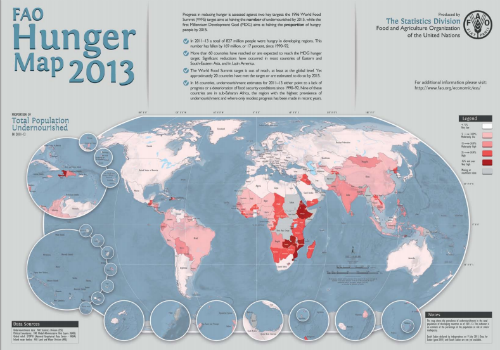In this blog post, Edele Sheehan from mHealth and Victoria Clause from mAgri highlight a joint mHealth and mAgri initiative, which will deliver a range of mobile services focused on nutrition, agriculture and healthcare in 14 developing countries.
Today is World Food Day.
Today is important to every single inhabitant of the planet, although the degree of relevance varies widely from region to region.
Globally, an estimated 7% of children under the age of five are overweight. While at the same time…. nearly one in six children under the age of five is underweight in developing countries; one in four has stunted growth.
A total of 842 million people in 2011–13, or around one in eight people in the world, were estimated to be suffering from chronic hunger, regularly not getting enough food to conduct an active life. While this figure is lower than the 868 million reported with reference to 2010–12 and the total number of undernourished has fallen by 17% since 1990–92, there is still a very long way to go.
World Food Day 2013 Theme
World Food Day came into being on 16th October 1945, to commemorate annually the date of the founding of the Food and Agriculture Organization (FAO) of the United Nations, to raise awareness of the urgent issue of chronic hunger and promote positive action through events held in 150 countries.
Since 1981, World Food Day has adopted a specific theme every year, in order to highlight areas in need of action. The chosen theme for this year is Sustainable Food Systems for Food Security and Nutrition – one that is extremely relevant for our work at the GSMA.
(click on image to open PDF)
How can mobile contribute to tackling the issues?
Two of the GSMA Mobile for Development programmes – mHealth and mAgri, recently announced a partnership with the UK Government to deliver a range of mobile services covering the connected areas of nutrition, agriculture and healthcare in 10 countries in Africa and 4 countries in South Asia, over a 20-month cycle in each country. You can read more information about the mHealth workstream here.
Mobile phone penetration in the developing world now exceeds 70% and is continuing to grow rapidly. Mobile provides a channel for health, nutrition and agriculture information that enables a level of scale that is not possible with face to face services.
Under the GSMA mAgri Programme (and with the support of the UK Government) the expansion of the mFarmer Initiative will enhance the livelihoods of smallholder farmers in emerging markets by improving their access to agriculture and nutrition information, financial services and supply chain solutions, delivered via mobile through sustainable business models.
Undernourishment is a growing problem in Africa and Asia, which is expected to worsen due to increases in global demand for food, scarcity of resources for agriculture production and climate change. These factors will lead to supply and demand imbalances, volatility of food prices, and possibly longer term rises in food prices which will further impact the underserved who already spend 75% of their income on food.
By improving access to nutrition advice, both in terms of health information and agriculture advice (such as information on crops with higher nutritional value), the GSMA’s mHealth and mAgri programmes are contributing to the tackling the critical issues we all recognise on World Food Day 2013.
Photo: [Top] Men sell fresh vegetables they grew at a village market in Baniajuri Union, Manikganj District, Bangladesh. © 2004 Syed Ziaul Habib Roobon, Courtesy of Photoshare; [Bottom] Courtesy of FAO.


